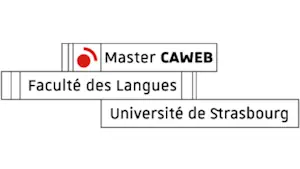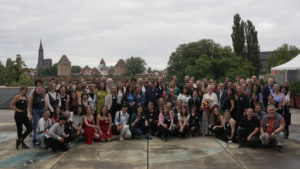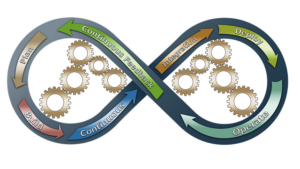Digital Transformation and Specialization in Translation
On 21st and 22nd February 2019, Barcelona hosted “Elia Together”. This two-day event brought together language professionals and freelance translators from around the world. This year’s theme was Mastering Digital Transformation and one of the speakers was Hélène Bajon, head of CLIP – Center for Language Industry Professionals, a certification body based in France, and teacher at the University of Strasbourg. She shared her insight on digital transformation and specialization in translation.
How translators master digital transformation by specializing in core competencies
Steffi Ullrich, one of her TCLoc Master’s students, talked with Hélène about the event.
Hélène, what is your general impression of the conference?

Credit : Steffi Ullrich
I found that there was a very enjoyable collaborative vibe between companies and freelancers. People mingled easily, freely exchanging ideas outside the usual customer-supplier relationship.
The main topics discussed focused on specialization in translation and digital trends.
I particularly appreciated what the Keynote speaker, Professor Zamora, mentioned — we have to change our mindset, because we have absolutely no idea what the digital future holds for us. He said that it was more a matter of mindset than of specific trends, and I totally agree with him on that. Our mindset is key and will be our best differentiator. Being open and adaptive to trends is certainly key.
Why did you choose to talk about “Specializing in core competencies”?
I chose my topic “Specializing in core competencies: Strengthening strategic skills in an ever-changing environment” with a view at the future of the translation industry. Digitization and Artificial Intelligence (AI) are a fact, and they are everywhere. We live at a time when machines can translate, interpret and even create content from scratch very easily, which seems to be a big threat for us all.
However, my point is that instead of freaking out, panicking or giving up because we fear that these machines will destroy our jobs, we can and should focus on our strengths, our core competencies, and invest in them.
We should collectively and individually think about the added-value we bring to our jobs. We should strengthen the unique set of skills that are valued. That is why I believe that translators should ask themselves: “What makes me different?” instead of merely “What can I specialize in?”
To get back to the session I gave, I chose to focus on the different strategic moves one can adopt when in an environment with an intense level of competition. Indeed, translators can feel that specializing might be the only way they can differentiate from competitors. In my speech, I wanted to let them know that academic business theories demonstrated that there are other ways to do so in an industry with such an intense competitive rivalry as translation.
The “Core Competency” model of K. Prahalad and G. Hamel for instance, is worth studying. These researchers suggested that we could adopt another approach to think about competition. Instead of looking at the business environment, let’s look at ourselves. What makes me unique as a professional? What helps me bring a perceived added-value to my customers?
I firmly believe that the traditional approach of adding new skills to improve our business profiles and of continuous learning is valid. But doing so without analyzing one’s own profile is a pity. We should not rely on a model where we only look at the environment, at the market. On the contrary, we should define our core competencies and strengthen them.
Of course, if you identify that your core competencies are strongly linked to a given specialization, then go for it, it will make you even more rare and sought after. But do not specialize just by opportunity, without choosing, let’s say only because you have a regular customer and volumes in a given sector. Specialization in translation is wise for those with special interests in a certain field or who have a specific personal or professional background. But specialization in translation should always be done for good reasons.
How will digital transformation affect the translation industry?
Our industry can get trapped in fear with the intense digital transformation that has just started. It seems that everyone is afraid to become jobless in the near future. Translators are afraid of the incredible progress of AI, translation companies are afraid of advanced freelance platforms, freelance platforms are afraid of newly-created and integrated CAT-Tool-related platforms, etc. Fears and doubts are well-hidden but everywhere.
This fear is understandable because digitization has the power to change everything. It’s like reshuffling playing cards, nobody knows the cards they will get next turn. My guess, though, is that digitization will shape the industry in a different way, but it will not change what is important: content, skills and processes. There is this quote I like: “If the computer can do it, it is not a skill.”
To be more specific, maybe right now some translation actors notice a change due to the numerous online translators’ platforms that are available in a few clicks. Maybe, with these massive databases and new services clients tend to think that translation is just a step instead of being a process.
Sure, this is how things are evolving. There might consequently be in the coming years a massive shift towards these fast and cheap services. But then — then one day, we might re-discover old-style processes like TEP (Translating-Editing-Proofreading) because of recurring dissatisfactions in T-only or light post-editing-only processes, or because of other project specificities. The language industry has always experienced regular pendulum swings since its emerged as an industry in the 90’s.
Another trend I’m very interested in is language. In the coming years, we might re-discover that translation is more about mastering one’s mother tongue than understanding foreign languages.
I sometimes think that we will get back to basics and re-invent quality processes. Maybe even re-invent translation skills. We’ll see…
What would be your advice to future translators?
I would advise future translators to take some time to think.
First of all, to introspect. What is your deep motivation as a translator? What is your real pleasure when translating? And what is your value, your background, your education? To sum it up, what is the unique harmonized set of skills that defines your core competencies?
Then I would recommend focusing on these core competencies and designing a tailor-made strategy accordingly.
Of course, one of your strategies can be specialization in translation. But be ready to really be different or to become an expert. For instance, imagine you want to specialize in medical translation. You can be different because you have a veterinary background for example, or because your partner or parents are doctors for instance, or just because you are passionate about medical content and cannot help reading and learning about it continually. The industry needs Subject Matter Experts, real specialists, so in these cases it can be a brilliant orientation. But if it is not the case, if you just picked “medical translation” because you like it, then pick another strategy.
My second piece of advice would be to go and find what your clients are looking for and what they do value. Writing down the name of your degree and the years of your experience in a CV is not enough to get a translation job. Clearly display your strengths and unique selling points, your skills and knowledge, your personality and hobbies. Identify and write down the relevant special skills you offer. In other words: what are you better at than other translators? Are you more flexible or do you work faster than others? Are you better at rephrasing or at terminology searching?
When applying to a company, put yourself in the shoes of your recruiters. If you cannot, whenever you have the opportunity to meet Vendor Managers, ask them how they make their recruiting decisions. Knowing what your clients want and value is always the best sales advice.
Ultimately, as I was saying during my talk at “Elia Together”, the key question would be to define the skills of a good translator. Being a good translator is not only a matter of CAT-Tool expertise. This is just a prerequisite.
My best advice for translators would be to think about what a good translator is. Let’s be creative! Good translators spot errors, inconsistencies and potential understanding problems. Or good translators understand what is at stake for the company they translate for. Maybe they have a very good understanding of business needs or contexts. Or they have the adequate mindset in order to be able to put themselves in their readers’ shoes or clients’ shoes. You can see that it goes far beyond tool management or field specialization.
Maybe the biggest change translators can make in their professional life is to turn into mini-consultants in their field. And for some of them, their field will be… language!
Indeed, basic language skills are and will be essential, some trends showing that these skills might become rare in the coming years. The Voltaire Certification in France called my attention with their grammar and spelling test schools, universities and companies request young graduates to take and pass. Together with the evolutions of our Information Era, this led me to think that language skills in translation will become key again in the coming years. Because they will be so rare, and that we will all need people to confirm, verify, correct, proofread, validate what is being published and released. And this, specifically, might be good news for translators, since it can widen their business scope.
At the end of my talk, we collectively ended up thinking that if focusing on our core competencies leads us to consider language skills as distinctive for translators, maybe labelling translators as “translators” is restrictive. Why not change this job title to “language specialist”, “language consultant”, “reviewer”, for instance. This is surely one job the machine will not be ready to steal. And it is so much more positive and fearless than sticking to the old MTPE debate!
Thank you very much for this interview about specialization in translation and the interesting insights!
Interview by Steffi Ullrich, TCLoc Master’s
What are your thoughts on this topic? Please leave a comment.
Other articles
-

Discover our online Master’s CAWEB Program in digital communication
-

The Importance of Visual Hierarchy for an Optimized User Experience
-

Elham Mehrzadkia’s Experience with the Master CAWEB Program as an Aspiring Web Designer
-

The importance of User Research in UX design
-

Celebrating 20 Years of Excellence: The 20th Anniversary of the Master CAWEB

